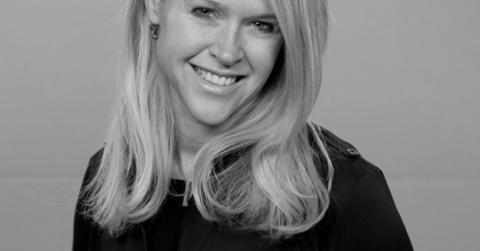It is becoming more common to hear of millennials – specifically women—shattering glass ceilings across a variety of sectors. From technology to finance, government and even nonprofit, women are becoming trailblazers in industries that need them the most. And while our generation is often labeled as entitled or demanding leadership opportunities, there are some instances where we may have no choice but to accept the position, feel the fear and do it anyway.
Kristi Ross, president and founder of dough, learned that very lesson early in her career, and the importance of what it means to get out of her own way in order to be the best leader that she could be for the company. Offered the position of chief financial officer of UniStaff, a placement firm with 6,000 employees, at the tender age 25, Kristi knew that it was too good of an opportunity to pass up.
“While I knew I didn’t know everything, working in public accounting had taught me there were endless resources available I could tap into,” she says. “I also knew my own strengths, and knew I would truly dig until I was able to figure ‘it’ out, whatever ‘it’ was that I would encounter.”
And while Kristi made her share of mistakes, she learned more about herself in those few years than any other part of her career. “I had always considered my perfectionist nature one of my greatest strengths,” she says. “[But] as CFO, I learned it is better to have a motto of ‘better done than perfect,’ and get more done to move the company forward. I also learned I had to avoid projecting my perfectionist expectations on others, because they were rarely able to meet those unrealistic expectations, a lesson that I’ve applied in both my personal and professional life.” Holding a CFO role at such a young age positioned her well for the next phase of her life, and allowed Kristi to enter an industry she truly had a passion for: the financial markets and trading industry.
At dough, Kristi and her team of financial experts work together to empower the do-it-yourself investor by providing a logical, mechanical approach to investing. They clear the noise and help investors pay attention to what is important. “We provide a new way to look at your investments by helping you focus on your probability of success and return on capital prior to ever even placing your trade,” Kristi says.
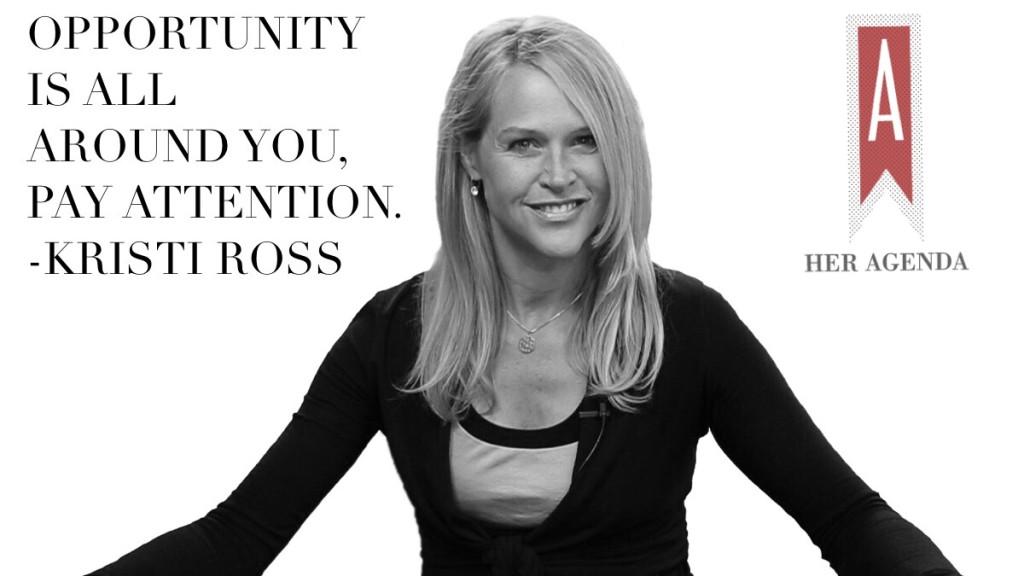
Her Agenda: Do you recall when you first became passionate about money management? Can you name someone who inspired you to go into your particular career field, or to be a leader?
Kristi Ross: As far back as elementary school, my dad taught me I could be whatever I wanted to be. We’d even discuss “business ideas” in the early morning hours before he’d head off to work while it was still dark out. My parents were divorced by the time I was ten. I lived with my incredibly hard-working mother, who died when I was in high school, so the “need” for me to learn about money management at a young age was somewhat forced upon me. However, the feeling of taking control of my finances was empowering and sparked my curiosity even more. I asked a lot of questions and had to seek answers for myself when I realized no one was going to take care of it unless I did. With a foundation of exceptional support early on in my life, I attribute that core tenacity of never giving up to my parents.
But the core desire to go into the financial markets was sparked when I was exposed to traders and brokerage firms when I was working as a CPA right out of college. Most of the clients I worked on were in the financial services industry. The excitement, uncertainty and complexity of the markets intrigued me. And while I didn’t make the leap to a trading company for a handful of years after, the desire and curiosity grew as I was exposed to other fields where the energy levels were nowhere near as high.
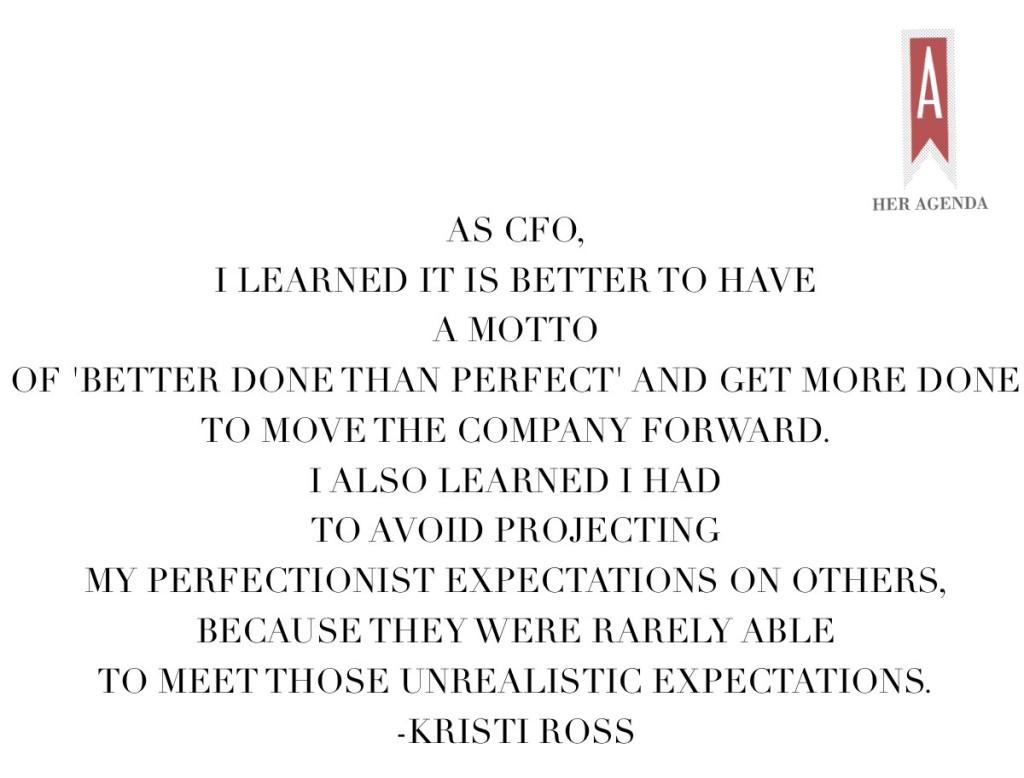
Her Agenda: Why do you think it is important for millennials to make savvy financial decisions early on? What advice would you give your 25-year-old self on how to manage money, and what things would you advise her to invest in?
Kristi Ross: It is important for millennials (and people of all ages) to better understand the financial landscape. We should ask questions about what happens to our investments when we contribute to a 401k. Millennials work hard to make and save money, so why “blindly” hand it over to someone who does not offer up simplified transparency and explain why and what the probability of success is.
If I were to tell my 25-year-old self what to do with my money, I would start by explaining the financial landscape and provide the questions that should be asked as I “hand over my money.” Learn what buying a stock means. Learn what options are. Learn how they can be used to increase your probability of success and then actually make a small trade. Hands-on learning is one of the most powerful educational tools because it forces you to ask the tough questions and provides a deeper learning experience. Passivity causes you to miss the important fundamentals.
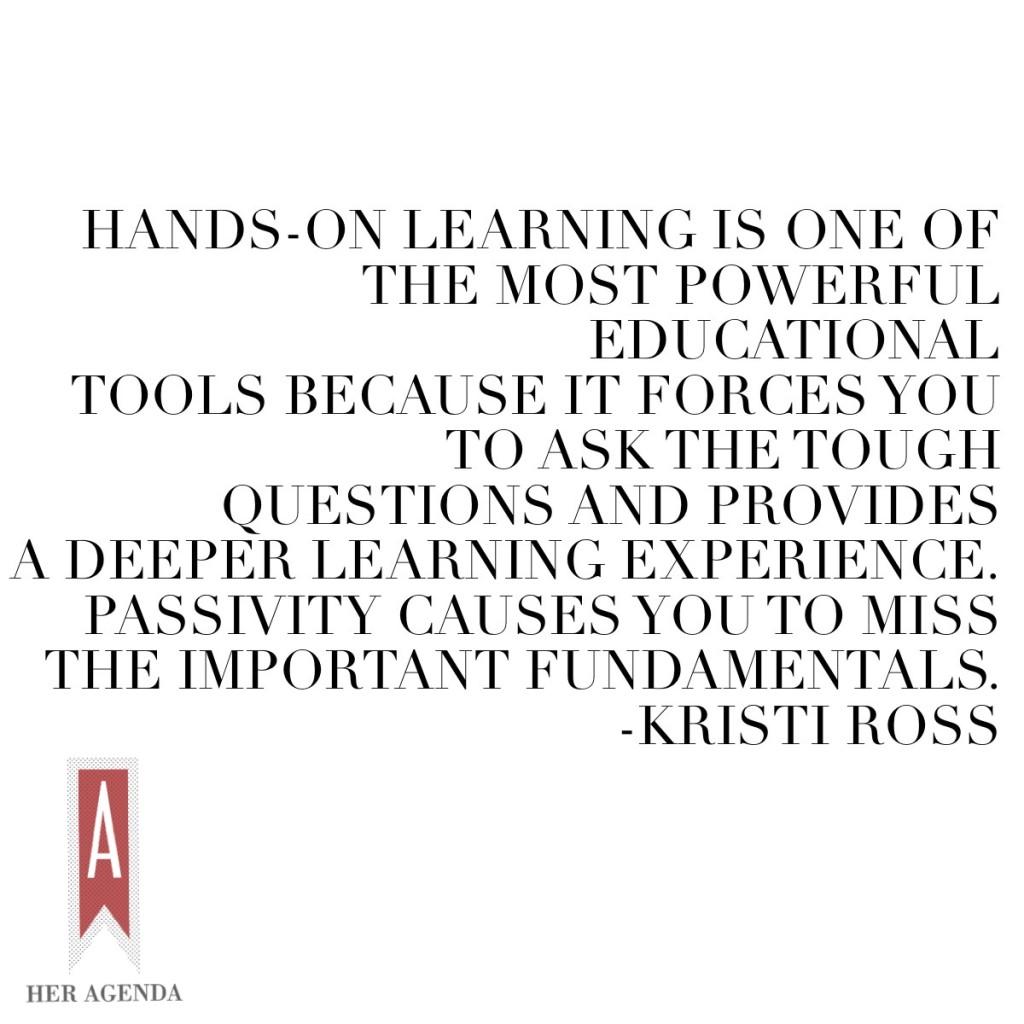
Her Agenda: What was the most challenging decision you’ve ever had to make as a leader? What lessons did you learn from that moment?
KR: One of the most challenging decisions I faced as a leader was admitting I was wrong and to change course, quickly. I made a bad decision to put money into a marketing campaign prior to really truly being ready. More than halfway through it, I realized it was a bad (and expensive) decision. Everyone will make a mistake at some point in their career. The important part of making a mistake is how quickly you rectify a situation and what you do to change course that sets you apart as a leader.
Her Agenda: As your career has grown and evolved, how much easier (or difficult) has it become to achieve work-life balance?
KR: Don’t believe anyone who says that work-life balance is easy because it’s not. However, there are a number of things you can do to obtain a sense of balance and pleasure in “doing it all.”
First of all, one of the most important things is to “Do what you love and love what you do!” Discovering your passion and making a career out of it is incredibly important because you spend a majority of your life doing it…you should enjoy it! You will be a better person, spouse, friend, parent, etc. for it because if you are happy, it is infectious and bleeds into every aspect of your life.
Second, find ways to set boundaries. I have three wonderful girls…one in elementary school, one in middle school and one in high school. Over the course of my career, I have worked countless hours and have been “on” 24/7…still am. But I made a commitment many years ago, to limit my travel when I could and to always be there in the mornings to make a hot breakfast, pack their lunches and get them off to school. I have tried to provide as much consistency as I possibly can and set those boundaries and expectations knowing I could achieve them and that there would be positive outcomes.
So, yes, you can “have it all” depending on how you define “all.”Don’t let guilt overburden you and remember to keep things in perspective. You will fail at keeping everyone happy all the time. It is all in how you deal with it when the balance gets pushed out of whack. So, when your daughter’s gym uniform didn’t get washed and she is melting down, you can either show her how to use the washing machine, spray the gym uniform with perfume, or hand it back to her to let her know that no one will probably ever even notice for one day that it isn’t clean. And, to be honest, any of those are perfectly acceptable. Find what works for you.
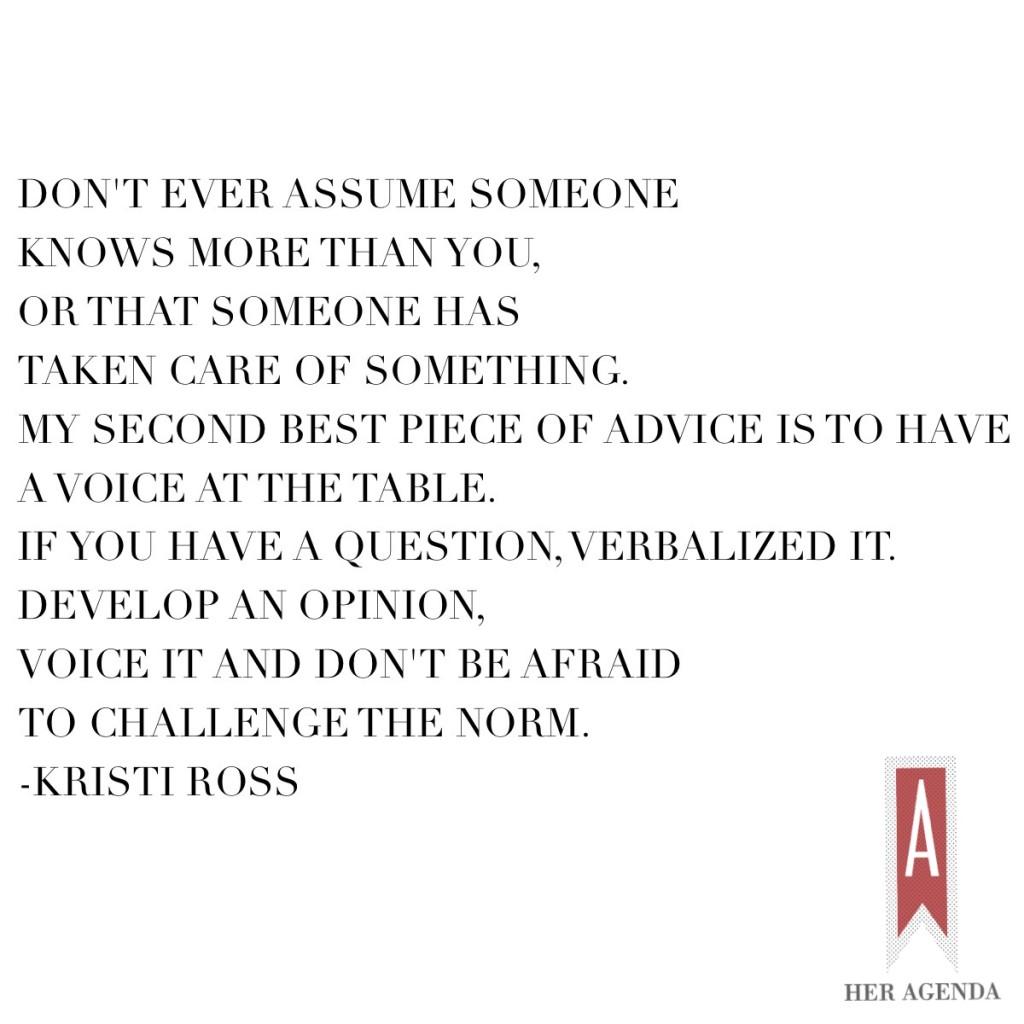
Her Agenda: What is the best piece of advice that you have received?
KR: There are actually two best pieces of advice that I have received over the course of my career. One is that “opportunity is all around you…pay attention.” Missed opportunities happen all the time because of silence and assumptions. Don’t ever assume someone knows more than you, or that someone has taken care of something. My second best piece of advice is to have a voice at the table. If you have a question, verbalize it. Develop an opinion, voice it and don’t be afraid to challenge the norm. Always ask the question.

